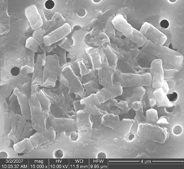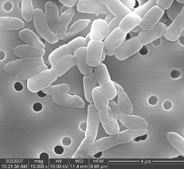Shankar Chellam, professor of environmental engineering at the UH Cullen College of Engineering, and environmental engineering graduate student, Appala Raju Badireddy, have demonstrated a new technique that reduces the biological fouling of water purification filters caused by the growth of bacteria colonies and the formation of biofilm. Featured on the cover of the February issue of Biotechnology & Bioengineering, Chellam’s findings may lead to more advanced methods of treating membrane filters.
"Bacteria quickly colonize water purification system filters, clogging and inhibiting them from performing optimally," said Chellam. "We developed a method that may reduce filter clogging due to bacteria growth and biofilm formation."
Biological fouling, as it is called, occurs when bacteria begin to spawn and colonize a membrane filter. As they begin to rapidly multiply—doubling roughly every hour—bacteria encase themselves in extracellular polymeric substances (EPS) to protect the colony and adhere more strongly to the filter substrate.
EPS is comprised of proteins and polysaccharides, or complex carbohydrates, which are secreted by bacteria as a defense mechanism to combat various environmental threats. Together, the mass of growing bacteria and EPS create a robust biofilm, which inevitably clogs part of the membrane filter, reducing its ability to operate properly. When this biological fouling occurs, large water purification systems have to be chemically cleaned, a process that is time consuming and wasteful.
"We hypothesized that by being able to regulate bacterial secretion of these proteins and polysaccharides, that we could reduce the negative impacts of biological fouling, prolonging the life of the filter," said Chellam.
Chellam and Badireddy worked with collaborators at the Environmental Molecular Sciences Laboratory at the Pacific Northwest National Laboratory to test the impact that a bismuth compound might have on bacterial secretion. In the same way Pepto-Bismol combats bacteria within the human body, they theorized that bismuth (BisBAL) would have a similar effect on a bacteria colony inhabiting a water filter. With the use of atomic force and electron microscopy, they were able to observe a 95% reduction in EPS secretion over a five-day period in the presence of the bismuth.
"We've observed that the compound prevents the polymers from developing, therefore eliminating the protective barrier that the bacteria need to successfully populate the filter," he said.
Chellam adds that while the study was intended to characterize biofilm formation in systems for water purification, the findings may contribute to advanced methods aimed at reducing biological fouling in the future.
"Right now, the environmental impacts of introducing bismuth are not fully understood," he said. "However, it may be possible to eventually impregnated a filter with bismuth to fight off developing bacteria colonies, so we are excited about our findings."
Chellam's water purification research is federally funded by the National Science Foundation and the Department of Interior, and by the Texas Hazardous Waste Research Center.


